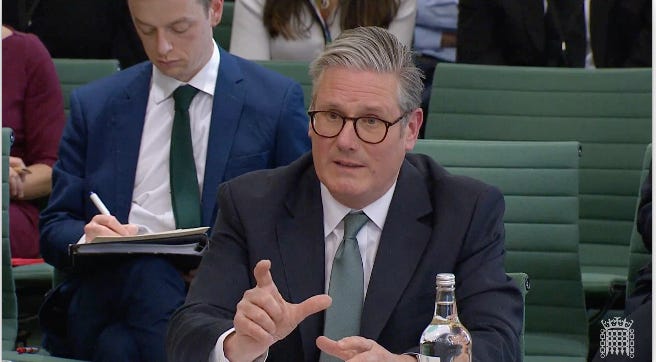(Not So) Dangerous Liaisons
Keir Starmer’s performance at the Liaison Committee demonstrated the value of PMQs
I saw a one-man show recently. In the bar afterwards, a friend asked me what I thought. I replied that I was impressed the actor had managed to learn all those lines. And I really was. With a running time of 70 minutes, the script must have contained 10,000 to 12,000 words. Still, this was not the sort of review marketing departments splash across billboards. A decent memory represents a prerequisite, rather than fulsome praise.
I was reminded of this by Keir Starmer’s performance in front of the Liaison Committee1 on Tuesday afternoon. The prime minister stuck closely to his script, regurgitating various rote lines and earnestly promising to provide in writing any information he could not instantly recall. It was, in some ways, a bravura performance.
Of course, Starmer was under no obligation to commit news, make a gaffe or slag off his own government. And there were occasional moments of discomfort, particularly around the impact of his welfare reforms and funding for social care. There was also a very Starmer-esque moment when Layla Moran, chair of the Health and Social Care Committee, referred to a figure of “around £800m”, only for the prime minister to point out this was in fact £880m.
Yet having watched all 90 minutes, one would not necessarily know that the President of the United States had recently sparked a trade war, changed sides in a shooting war and sent global markets tumbling. In fact, the whole thing made me yearn for a much maligned form of parliamentary scrutiny: prime minister’s questions.
When analysed through the prism of ‘who won and who lost?’, PMQs is a fairly pointless exercise. Indeed, in his final performance at the despatch box as leader of the opposition, with the Tories under his leadership winning just a single additional seat at the 2001 general election, William Hague described his exchanges with Tony Blair as “exciting, fascinating, fun and an enormous challenge, and from my point of view, wholly unproductive in every sense."
Generally speaking, the prime minister really ought to ‘win’ the exchanges, on the basis that he or she is under no obligation to actually answer the question and always enjoys the last word. But when viewed as an exercise in what can be learned – about both the prime minister and leader of the opposition – PMQs begins to make a lot more sense2.
PMQs forces prime ministers to know everything that is going on in their government
PMQs enables party leaders to test and refine their attacking and defensive lines
PMQs can highlight a contradiction within government policy or a cabinet division
PMQs is a means to boost the mood amongst backbenchers. Indeed, it is far from assured that Hague would even have survived to fight the 2001 election had he not been such a strong performer in these exchanges
PMQs is a test of a prime minister’s and opposition leader’s authority
The stress of PMQs can reveal what makes otherwise well-groomed and rehearsed politicians tick. Losing one’s temper or failing to go for the jugular is noticed
In the age of the social media clip, PMQs is an opportunity to generate viral material that your comms team can disseminate and, even better, ordinary people share online
The Liaison Committee is not generally considered a venue for boisterous political debate. Prime ministers can expect a gentle poaching as opposed to a grilling. Moreover, on the day parliament rises for recess, and in the midst of a geopolitical and economic firestorm, Starmer was perfectly entitled to read out his script and leave.
Still, it felt like an opportunity missed. With the local elections weeks away, unhappy Labour MPs returning to their constituencies and the world changing beneath our collective feet, the prime minister could have used the moment to shape opinion. Instead, he merely reminded us all that he is pretty good at learning his lines.
The Liaison Committee is comprised of select committee chairs. Its mandate is to consider the overall work of select committees and promote effective scrutiny of government
Ayesha Hazarika and Tom Hamilton wrote what I think we can now call the seminal book on the subject, Punch & Judy Politics An Insider’s Guide to Prime Minister’s Questions



